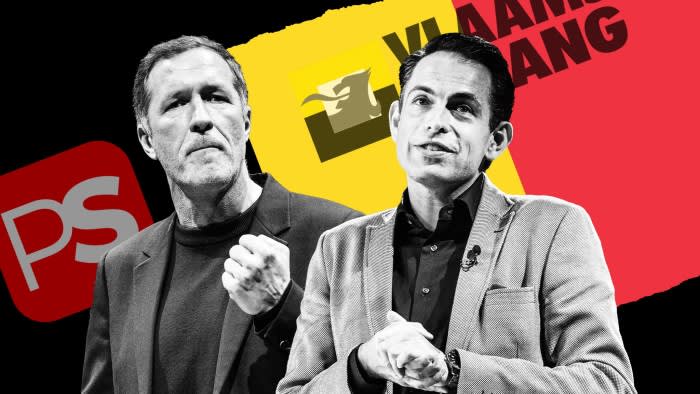Bart Claes, a VB member of the Flemish parliament, said Vlimmeren in the north of the country was “fertile ground” for his party © Sarah Van Looy/FT
At a village fair in Vlimmeren, around 60km north-east of Brussels, VB recently set up a stall under the banner “Flanders is ours again”.
Bart Claes, a VB member of the Flemish parliament, said the rural area was “fertile ground” for his party. “People have a feeling, a righteous feeling, that they’re being let down and forgotten by the policymakers.”
Party leader Tom Van Grieken argues that Flanders’ secession from Belgium is not just a “romantic” ideal, but that “it is also a financial thing”, arguing that the northern region should no longer be footing the bill for less wealthy Wallonia.
“Belgium has to change,” said Van Grieken. “The elite in Belgium is very conscious and aware about climate change and the end of the world. A lot of Flemish people are worried about the end of the month.”
Jarno Princen, a 26-year-old dock worker at the port of Antwerp originally from Vlimmeren, said VB was the only party that takes the issue of “illegal immigrants that are coming to Belgium” seriously. He complained about asylum seekers receiving better treatment than Belgians without working. “I find that negative to the other people that work hard and earn less,” he added.
Despite Van Grieken’s push for secession, analysts and even Vlaams Belang voters are sceptical it will ever materialise. The move would trigger a constitutional crisis and throw into question the status of the capital Brussels, which is its own bilingual region within Flanders.
“They are a little bit extreme. When they come into [power] they must calm down,” said Veerle Oosthuizen, a 44-year-old VB voter who works in building renovation.
If Flanders is dominated by right-wing parties, the polar opposite is true of Wallonia, where the Socialist Party (PS) is dominant and its challengers come from the far-left, not the far-right.
At a PS congress on May Day in the city of Charleroi, supporters waved red flags and chanted the international workers’ anthem. “I vote socialist because I come from a socialist background,” said Guillaume Thyrion, a 23-year-old communications student whose family has been working in factories for generations. “It’s the only true workers’ party.”
But that banner has also been taken up by the Workers’ Party, which is one of the few cross-border parties that also campaigns in Flanders, with moderate success.
In Wallonia, the Workers’ Party campaign for a tax on millionaires and an end to austerity measures is gaining traction. It is now polling third at 16 per cent in the French-speaking region, compared with 11 per cent in the last regional election. The party would come second in the federal parliament because of its strong showing in Brussels, where it is also polling at 16 per cent plus the 11 per cent it would gain in Flanders, according to polls.
“People don’t see themselves represented anymore,” said Peter Mertens, general secretary of the Workers’ Party. “There is this huge gap between the political landscape . . . and reality on the factory floors.”
Mertens said that unlike the far right, his party is trying to frame this in a “positive” way. “They’re trying to mobilise people’s anger against other people who are in misery, against the refugees.”
VB’s “dangerous agenda” on independence would fail, Mertens predicted. “It’s no coincidence that this is the place of surrealism,” Mertens said in reference to Belgium’s famous artistic movement. “There is more unity about staying together in this surrealistic Belgium than being apart.”
Didier Caluwaerts, professor at the Free University Brussels (VUB) said the two regions had been historically divided along party lines: “Flanders has always been more conservative, more right-wing than Wallonia.”
With its large industries, Wallonia was Belgium’s “economic powerhouse” until roughly the 1950s, after which investment shifted to Flanders and the francophone region’s industrial base declined, according to Caluwaerts. This “economic legacy” together with high unemployment and lower economic growth were all reasons why the left was stronger in Wallonia, he added.
If VB entered a coalition with N-VA at a regional level, it could have repercussions for the federal government, as other parties would be forced to shun them both, said Paul Magnette, head of the PS. “Working with people who work with the far right is out of the question.
“It’s true there is a general tendency in Europe towards political fragmentation,” said Magnette. “Belgium has always been able to govern itself, whatever happens. We are the example that even when it’s too complicated, we will get there.”
Additional reporting by Alice Hancock in Mons
Video: Why the far right is surging in Europe | FT Film
Source link : https://www.ft.com/content/6943090d-6746-4712-be19-77e6a64f95e4
Author :
Publish date : 2024-05-25 07:00:00
Copyright for syndicated content belongs to the linked Source.
